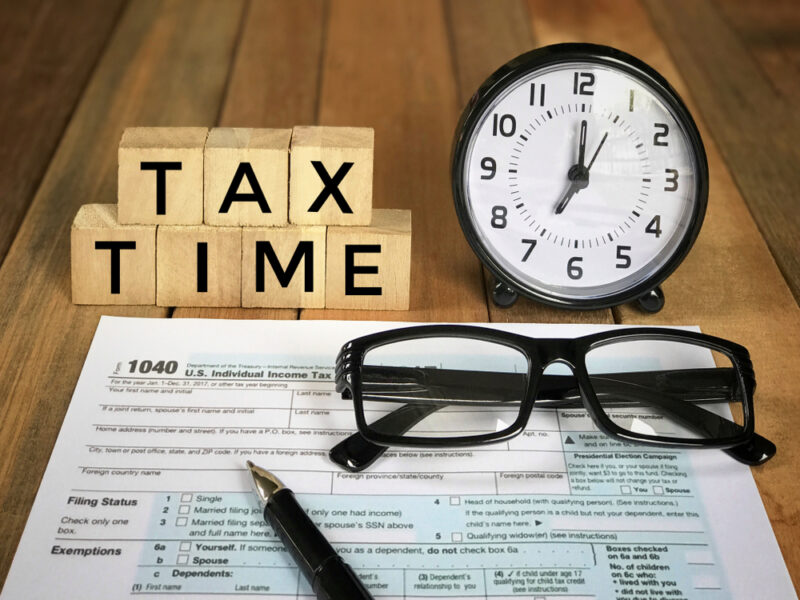With millions of Americans now vaccinated, we are closer than ever to the dream of returning to a new sense of normalcy. And while COVID-19 created an atmosphere of uncertainty and unpredictability, we can all rest assured that something will never change— we will all have to pay our taxes.
The world continues to reopen, and perhaps many boomers and retirees are thinking that it’s finally time to live a little. Before they take that trip around the world, you’ll want to make sure everyone is prepared come the extended Tax Day— May 17, 2021.

Tax Deadlines
Remember how the IRS pushed back Federal Tax Day 2020 to July 15 thanks to COVID-19? Since that move, many seniors mistakenly believe that the same July extension to file taxes is in place for 2021. The actual deadline is May 17, 2021. The IRS announced in March that it was extending the filing date due to the pandemic, and it applies to all individual taxpayers, including those who pay self-employment tax. Be sure to check with your state government website for any information regarding changes on the local level.
The IRS will penalize any taxes not paid after May 17, unless you request an extension. Don’t forget— the IRS will allow you to set up a payment plan as well.

What To Know About Stimulus Checks
The IRS sent out millions of checks in the third round of the economic stimulus. If you received one, you may be wondering if that money is taxable. According to the IRS website, the payment you received is NOT considered income, and you will not owe any taxes on it. Nor will the payment reduce your refund or increase the amount you may owe.
While millions received their checks, millions of others did not; or perhaps they didn’t receive the full amount they believed they were entitled to. According to CNET, if you’re still missing money from the first or second round of checks, you must claim that money as a Recovery Rebate Credit (RRC) on your 2020 taxes, even if you don’t usually file them.
If you fall under the category of a non-filer—which means you’re among the millions who don’t file taxes because you’re either receiving social security or veterans benefits—you do not have to file in order to receive a stimulus check.

Deductions
As we age, more and more deductions become available, so you will want to make sure you are clear on what they are and take advantage of every deduction offered in order to lessen your income.
Since 2018’s Tax Cut and Jobs Act, the standard deduction has more or less doubled for everyone, but The Balance—a personal finance website—reports there is a bonus deduction for anyone age 65 or older.
As of tax year 2020, the base standard deductions before the bonus add-on for seniors are:
- $24,800 for married taxpayers who file jointly, and qualifying widow(ers)
- $18,650 for heads of household
- $12,400 for single taxpayers, and married taxpayers who file separately
For tax year 2021, which you file in 2022, the standard deductions are:
- $25,100 for married taxpayers who file jointly, and qualifying widow(ers)
- $18,800 for heads of household
- $12,550 for single taxpayers, and married taxpayers who file separately
“Many older taxpayers may find that their standard deduction plus the extra standard deduction for age works out to be more than any itemized expenses they can claim, particularly if their mortgages have been paid off so they don’t have that itemized interest deduction any longer,” The Balance stated.
Itemized Deductions
If you decide to itemize your deductions, there are plenty available to you. Did you have medical or dental expenses? These expenses can be deducted from your income on tax Schedule A, however be aware there is a limit of 7.5% of your adjusted gross income for both 2019 and 2020.
Retirement plan contributions can provide more deductions for older workers and retirees. According to US News & World Reports, anyone 50 or older can “defer paying income tax on more money than younger people by contributing to an IRA.” Once we turn 50, we are allowed to put an additional $1,000 away, or up to $7,000. The same can be said for workers with a 401k. Anyone over 50 can defer taxes on $6,500 and up to $26,000.

Charitable Donations
The Tax Cut and Jobs Act may have made the standard deduction more attractive, but it also made anyone who took the standard deduction ineligible to claim any donations to charitable causes. But there is a twist—the CARES Act permits you to claim a limited deduction on your 2020 federal taxes if you make a cash contribution up to $300.
“For the purposes of this deduction, qualifying organizations are those that are religious, charitable, educational, scientific or literary in purpose,” stated the IRS. “The CARES Act also temporarily suspends limits on charitable contributions and temporarily increases limits on contributions of food inventory.”
Taxpayers must give to qualified organizations to deduct their donations on their tax return. Use the Tax Exempt Organization Searchto find out if a specific charity qualifies as a charitable organization for income tax purposes.
Tax Credits
Schedule R, otherwise known as The Tax Credit For The Elderly and Disabled, is a tax credit available to anyone who is 65 years or older, is a US citizen or married to a US citizen, and falls within the required income limits provided by the IRS:
- Earn less than $17,500 if you’re single
- Earn less than $20,000 if you’re married but only one of you qualifies for the credit
- Earn less than $25,000 if you file a joint married return
- Earn less than $12,500 if you file a separate return but live apart all year
These income numbers are solely based on your adjusted gross income, not your total income, according to IRS rules. There are also rules limiting this credit based on the non-taxable portions of your Social Security benefit, if you receive them.
–
For more in-depth tax related questions, you can always contact your accountant or a personal finance expert.

